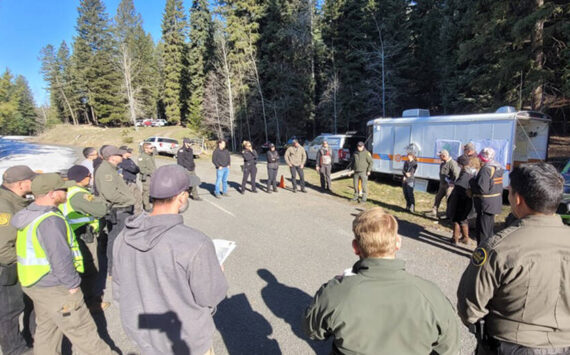OROVILLE – Okanogan County Commissioners took testimony on the Comprehensive Plan in a hearing held in Oroville Tuesday, March 1.
Okanogan County has been working to try and update its more than 40-year-old Comprehensive Plan for over three years. In the past representatives from the county planning department gathered comments from neighborhood vision groups toward that goal. However, after many people said they did not like the way the plan was headed, including the Okanogan County Coalition for Property Rights, the commissioners are asking for testimony in regards to the plan at hearings held throughout the county.
Last week’s hearing, held at 5 p.m. at the Oroville High School Commons, lasted more than four hours with testimony mostly running against more regulation. However, some testified they wanted regulation in order to maintain the county’s natural beauty and to avoid problems related to over development.
Chuck Oakes was the first to testify and said, “It is my understanding that you took $125,000 from the state to gather neighborhood vision statements and the last thing I heard was all that information has been lost.”
Oakes continued, “It is a shame that all those comments were lost if that’s true. I find a lot of words are best rhetorically used, like property rights… it can mean whatever. It is my understanding that the people with the deepest pockets have the property rights.”
Jerry Asmussen, a Tonasket area rancher and member of the school board, took a different view.
“I support simple and limited comprehensive planning,” he said, listing several currently allowed uses he felt should be ‘grandfathered’ in.
He said requiring conservation easements for approval of development on ones property was “nothing short of extortion.”
He concluded, “Are we going to tell people we’re open for business or closed?”
Kathy Powder of the Buzzard Lake area said she believed several things in the plan were alarming and told the commissioners to remember the promises they made when running for office.
Steve Lorz from Ellisforde said, “I don’t see much of the constitution in this pile of stuff. I see this as having to take more licenses, take more orders and follow more regulations.”
Mel Smith from Wauconda said he had been involved in the first community meetings regarding the plan.
“I called them the traveling candy show which promised we could have everything we want… it hasn’t worked out,” he said.
Stewart Gillespie, a self-proclaimed environmentalist with property in Chesaw said, “I thank the commissioners and planning department for having these hearings. This process is about responsibility. He said he supported designations of sub-area plans like the one proposed for the Methow.
One person testified that they had been in the construction business for several years and they had witnessed unattended growth and that’s why he had moved here.
“I want to keep things the way they are… I like abundance,” he said.
Sandy Vaughn from the Chesaw area testified she had concerns about allowing development as small as one acre, especially along waterways.
“I ask the commissioners to restore the 20 acre minimum, with five acres in towns. One acre is too much strain on our known water supply,” said Vaughn, adding that she supports sub-area planning.
“I think we should restore agriculture in the plan, we have an obligation to keep farming viable,” said Geri Gillespie from Chesaw. I think we should also restore the neighborhood group vision.”
Christa Ravia, from Aeneas Valley said her biggest concern was about the size of allowable land parcels, as well as the number of regulations in the plan.
“I am worried about having a 100 acre ranch and someone buying 30 acres from my neighbor and breaking it into 30 one-acre parcels… that’s asking for trouble.”
Jan Asmussen from Tonasket pointed out the many differences in attitude between the Methow and Okanogan valleys.
“By comparison it’s like comparing Okanogan County and King County,” she said. “The 42 page comprehensive plan is workable without the addition of the appendices, etc.”
Tasha Spears from the Loomis area said she strongly opposed the current plan.
“It is unduly oppressive to rural land owners,” adding that she felt it was too close to being comparable to the state’s Growth Management Act.
Spears said the GMA has led to “mountainous” litigation in other parts of the state.
Rob Stone from Tonasket said he had 125 acres in Tonasket and lived in “fabulous downtown Nighthawk.” He said property owners were the stewards of the land.
“If it comes down to it let us vote on our future, if the plan comes to pass, so be it. I own my land and I will refuse to let anyone tell me what to do with it,” said Stone to a round of applause from the audience.
Mitch Spears said he felt the currently proposed plan used GMA criteria and would shift control to the state.
“I urge you to adopt the revisions from the Coalition of Property Rights,” he said.
Gerald Green from Tonasket said the commissioners had a lot on their plate.
“I feel you guys will do the right thing,” Green added.
Orchardist Alan Godwin said he ran his orchards in such a way as to leave no carbon footprint and that his produce was certified organic.
“If you want agriculture to continue to be viable you need to give us flexibility,” he said.
Godwin added that part of his property was riverfront and should he need financing for his orchard he wants to be able to go to the bank and get a loan based on the value of the riverfront property and not have a comprehensive plan that would weaken the property’s value.
“I’ve worked in comprehensive planning. I am very concerned how these appendices work with this plan. I am very concerned about private property laws,” said Robin Stice, a Dry Gulch area farmer and owner of Eden Valley Guest Ranch.
“I think I do more than many of the people I see in trying to control my property… I don’t want my property controlled by someone else,” said Stice.
Joe Bond, a county commissioner in neighboring Ferry County, described some of the problems Ferry County has had under the Growth Management Act. Like Okanogan County, Ferry County could have opted out of GMA because it has a population of less than 50,000. However Ferry opted in and now has faced several lawsuits. Seventh District Rep. Joel Kretz’ bill to allow Ferry and three other small counties to opt out again has passed through the House and now goes to the Senate (see related story).
“These gentleman may come up with a plan that seems very acceptable, but these gentlemen will see lawsuits coming across their desks every week,” Bond said. “You should put the plan on hold and fight as long as you can. We’ve been fighting the Critical Areas Ordinance since 1991.”
Mike Angel from Loomis Road said he thought the county was a victim of “cut and paste” and likened the comp plan to the state Road Maintenance and Abandonment Plan debate.
“This is RMAPS II,” he said adding that he had five neighbors, describing the state as his worst neighbor, unable to control the weeds on their own property, and the federal government as his next worse neighbor, especially when it comes to fires and maintaining roads.
“You get rid of the State of Washington and the federal government and this will be a wealthy county again,” Angel said.
The commissioners called for a break at 7 p.m. and then testimony for and against the plan continued until 9 p.m. Like the hearing recently held in the Methow, this meeting brought out a lot of emotions and the commissioners had to gavel down some angry people at least twice. One person even compared the comp plan with the Communist Manifesto.






